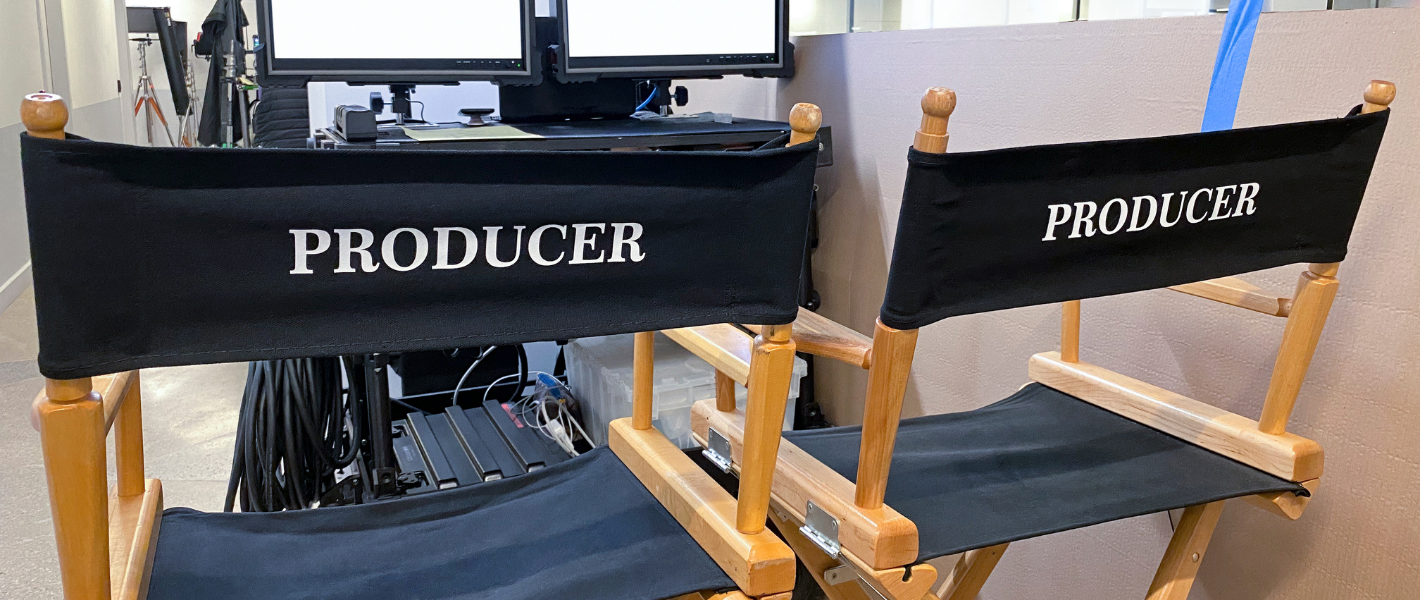Wondering how to become a film producer? Don’t worry, we got you covered in this article.
Film production is an intricate process that navigates through various stages, embracing the development, pre-production, production, post-production, and delivery phases. The multifaceted role of a producer entails meticulous oversight, ensuring that the production remains within budget, adheres to timelines, and aligns with the project’s objectives. Despite the challenging nature of the job, the producer finds it inherently rewarding, as it involves a unique blend of leadership, analytical thinking, and creativity. Managing diverse responsibilities, the producer must be a well-rounded individual, proficient in interpersonal skills, adaptable to unfamiliar situations, and adept at making swift decisions.

How to Become a Film Producer:
The Varied Role of a Film Producer
Embarking on a career in film production offers a plethora of pathways, each producer’s journey being distinct. Whether entering through post-production, production management, brand work, or client collaboration, the chosen niche significantly influences the producer’s role. The variations extend to different types of producers—executive producers, co-producers, producers, associate producers, and production managers—each carrying distinct responsibilities within their respective domains.
Navigating the Path to Becoming a Film Producer
Drawing from personal experiences, the producer recounts involvement in producing online content with AFGP, delving into commercial spaces and contributing to documentary feature films’ production management. Acknowledging the varied nature of roles, the producer emphasizes entry-level positions such as runner, team assistant, office assistant, or production assistant as gateways into the industry. Navigating through these roles allows aspiring producers to explore their preferences, shaping their trajectory within the production sphere.
Understanding the Production Department
An in-depth understanding of roles within the director and production departments proves crucial for aspiring producers. In the production department, roles progress from runners to production secretaries or assistants, production coordinators, and finally, production managers. Each position carries distinct responsibilities, contributing to the seamless execution of daily operations and the overall management of production.
Simultaneously, the director’s department introduces roles such as first, second, and third assistant directors, with specific duties in overseeing set activities, managing schedules, and coordinating background artists. This hierarchical structure within departments ensures a well-organized and efficient production process.
Skills and Traits of an Effective Film Producer
Transitioning to the producer’s insights, the multifaceted nature of the job becomes apparent. Balancing the humbling acknowledgment that the crew is a collaborative team rather than subordinates is paramount for effective leadership. Attention to detail emerges as a critical trait, requiring producers to anticipate and address potential issues, avoiding cascading consequences. Learning from mistakes is inevitable, but proactive measures and a cautious yet confident approach are crucial for success in a producer’s role.
The producer emphasizes the analytical aspect of the job, requiring foresight to plan weeks ahead and ensure every detail aligns with the production’s progress. This foresight extends to knowledge of various departments, emphasizing the importance of a producer’s well-rounded understanding of cameras, editing, makeup, hair, and other production aspects. While perfection may not be achievable, a producer’s dedication to continuous learning and understanding diverse departments sets the stage for excellence.
Key Principles for Aspiring Movie Producers
-
Focus on One Thing at a Time: Concentrate on mastering specific skills and aspects of production without getting overwhelmed.
-
Prioritize Creative and Marketing Skills: Balance technical proficiency with creative and marketing acumen to stand out in the competitive field.
-
Learn by Doing: Apply acquired skills to personal projects, creating a diverse portfolio that reflects your unique style.
-
Create a Learning Plan: Develop a structured plan for continuous improvement, with quarterly objectives to ensure steady progress.
-
Engage with the Community: Network with professionals, actively participate in online communities, and attend events to accelerate learning.
-
Embrace Lifelong Learning: Stay updated on industry changes, software advancements, and emerging trends to remain relevant.
-
Learn Just in Time: Adopt a “learn just in time” approach, acquiring knowledge when it aligns with specific goals and projects.
Film Composition Examples
Within this FREE PDF, you will discover:
- film composition examples in movies
- how filmmakers employ composition techniques
- how to create unforgettable cinematic experiences

The Five Stages of Film Production
A comprehensive exploration of film production unveils five key stages—development, pre-production, production, post-production, and distribution. However, the nuances within each stage are contingent on the specific niche, be it feature films, commercials, or television. Producers at different stages, such as development producers, line producers, and post-production producers, contribute their expertise to navigate the complexities of their respective phases.
Development: Involves script completion, securing financing, and partnering with various stakeholders. Producers play a vital role in pitching projects and securing funding.
Pre-Production: Focuses on crew hiring, location scouting, and logistical preparations. Producers coordinate various elements to ensure a smooth transition to the production phase.
Production: Encompasses the principal filming stage, where the producer oversees the execution of the plan developed during pre-production.
Post-Production: The magic happens here, as editors, VFX artists, sound engineers, and other specialists work together to bring the project to life. Producers manage the creative and budgetary aspects during this stage.
Delivery and Distribution: Involves paperwork and collaboration with distributors to execute the plans formulated in the development phase.
The producer provides a glimpse into the meticulous process of developing a script, securing financing, and engaging partners, a journey that can span years. Pre-production unfolds as a dynamic phase, demanding rigorous planning, crew hiring, location scouting, and meticulous preparation to set the stage for principal shooting.
As principal shooting commences, the producer’s role involves overseeing the smooth functioning of the production, managing potential issues, and aligning with the established timeline and budget. Post-production emerges as a phase where creativity converges, with editors, VFX artists, sound engineers, and colorists weaving cinematic magic. The producer’s role in this phase centers on budget management, creative input, and ensuring the alignment of the final product with the project’s vision.
The culmination of the production journey leads to delivery and distribution, marked by extensive paperwork and collaboration with distributors. Throughout these stages, a producer’s role extends beyond execution to strategic planning and meticulous coordination, ensuring the project’s success.
The Producer’s Dilemma: “Fix It in Post”
Acknowledging the industry’s penchant for the phrase “we’ll fix it in the post,” the producer offers a nuanced perspective. While post-production possesses the capability to rectify certain errors, a producer’s astute understanding of its limitations is vital. Not everything can be salvaged in post-production, necessitating a judicious approach to decision-making during principal shooting to avoid cascading consequences.
How to Become a Film Producer: Conclusion
In wrapping up, the path to becoming a film producer is this incredible, ever-evolving journey. It demands a mix of leadership, analytical smarts, and a keen creative eye. For anyone curious about how to become a film producer, the route is as diverse as the roles within the industry. Starting from the ground up, maybe as a production assistant, allows you to soak in the nuances of different departments. It’s a ride filled with continuous learning, solving challenges on the fly, and a deep respect for the collaborative magic of filmmaking.
And for those captivated by the idea of how to become a video editor, the film production adventure sheds light on the pivotal role editors play in the post-production phase. Piecing together visuals, sound, and effects is an art, making video editors indispensable in shaping the cinematic narrative. Budding editors can find their niche in post-production, refining their craft alongside the broader film production process.
So, whether you’re gunning for film producer stardom or eyeing the editing bay, the core principles stay the same. Dedication, adaptability, and a holistic understanding of the industry are your compass. The film production world is a rollercoaster of challenges and triumphs, offering a myriad of opportunities for those with a burning passion for bringing stories to life on the grand stage.
Film Composition Examples
Within this FREE PDF, you will discover:
- film composition examples in movies
- how filmmakers employ composition techniques
- how to create unforgettable cinematic experiences

Explore related content

Video Editing Tips CapCut: Tips, Tricks, and Techniques
Video editing is an art, and there are proper tools and techniques, through them everybody… Read More »Video Editing Tips CapCut: Tips, Tricks, and Techniques

Factors to Consider Before Buying a Video Editing Computer
From helping grow your brand and business to editing just for fun with the love… Read More »Factors to Consider Before Buying a Video Editing Computer

Best Video Editing Monitors in 2024
In the evolving world of video production, the importance of a high-quality monitor cannot be… Read More »Best Video Editing Monitors in 2024